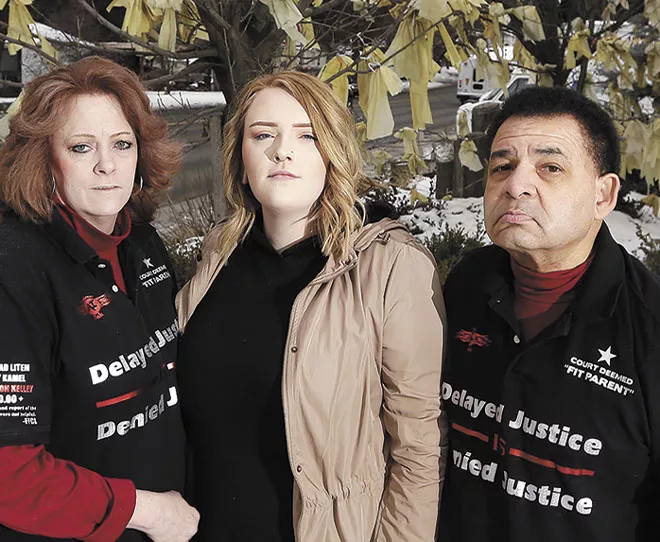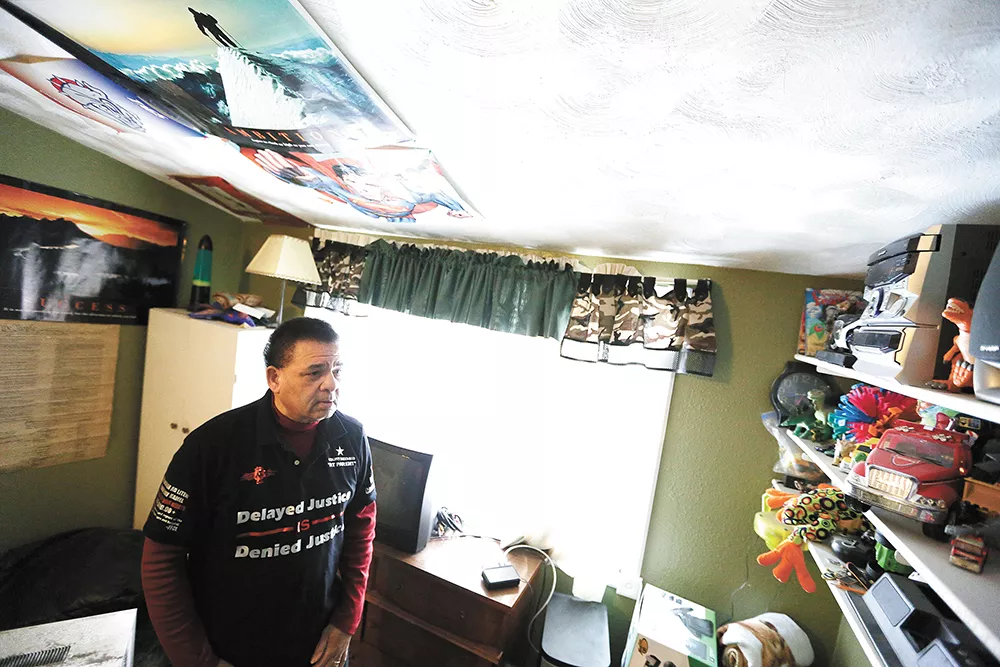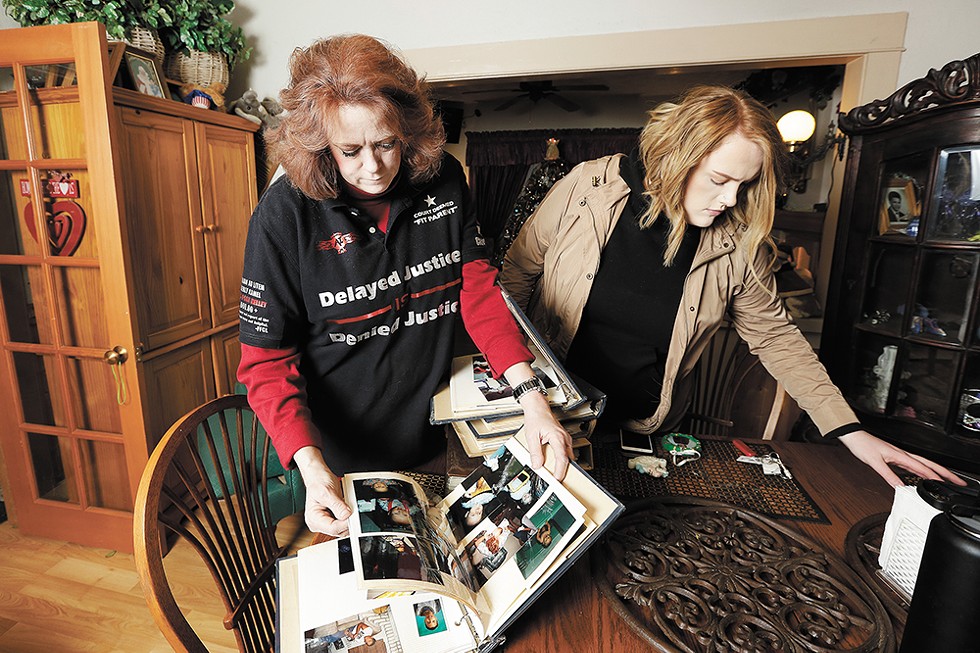
Teresa and Ron Simon know who took their son.
It wasn't a stranger. It was two people the Simons know well, people they once considered family.
But now, the Simons can't get their son back from them.
"He's missing. My son is missing," Teresa Simon says. "We never agreed to give him away."
It's been nearly three years since the Simons' son, who the Inlander will refer to as Bruce, his middle name, has been home with his biological parents. The 16-year-old lives with people he now considers his real parents, according to court filings. Their names are Doris Strand and Wayne Janke.
Strand and Janke have been part of his life, in one way or another, since the day Bruce was born. But in 2015, they gained custody of him and simultaneously blocked his biological parents from being involved in his life. They did so by taking advantage of Washington state's relatively loose laws on who can serve as a child's parent.
They argued that Bruce's biological parents were not fit to raise him. And they argued they were Bruce's "de facto" parents, a legal definition in Washington that grants nonbiological parents equal rights as biological parents.
The situation is a new twist on a question that Washington has been trying to answer for two decades: What constitutes a parent in the eyes of the law?
In Janke and Strand's view, granting rights to nonparents is necessary to provide children like Bruce with the home they deserve.
"He calls us 'Mom' and 'Dad,'" Janke tells the Inlander. "He calls our home his home."
But for the Simons, it's only been a way to take Bruce and hide him behind a wall of legalese, despite a judge finding that they are indeed "fit" parents.
"It's legalized abduction," Teresa says.

GIVE AND TAKE
Teresa and Ron Simon's only child together was born at Deaconess Medical Center in September 2001. As Teresa recovered from a C-section, it took hours before she could hold her son. Elsewhere in the hospital, family and friends gathered, waiting eagerly to see the baby.
And Teresa says that nobody was more eager than Doris Strand.
At the time, Teresa didn't know Strand very well. She was Ron's close friend, someone he had met in the late 1970s when he was an assistant manager at Albertsons and Strand was a checker. Teresa thought it a bit strange that Strand was there for so long on the day of her son's birth, but she says she didn't want to make it a big deal. Teresa, who has bipolar disorder that she manages, says she didn't want to give anyone an excuse to take her son from her.
"I didn't want to make a scene, because of this disorder," Teresa says.
For Strand, it was the the beginning of a long, bonded relationship with Bruce.
Strand declined to comment for this article, saying she doesn't want to trouble Bruce further. But in court declarations, she and Wayne Janke, who she lives with, portray themselves as people who began to take care of Bruce as an infant because the Simons didn't care. She describes moments where she felt the Simons ignored their son. She wanted to take it upon herself to provide him with the care she thought he was missing.
"I made it my mission in life to give [Bruce] a life of love and joy," she writes in court documents.
The Simons, who both worked and managed rental properties, admit that Strand and Janke helped to take care of Bruce. In the Simons' view, Janke and Strand were something like grandparents for him — in the role they played, not because they're any older than the Simons. They looked after him when the Simons couldn't, bought him gifts and took him skiing and on hunting and camping trips. Teresa and Ron say they thought the relationship was good for their son. They wanted him to do those things.
"We didn't say, 'Here, take my kid,'" Teresa says.
The Simons, feeling Bruce would be better served in the Central Valley School District instead of Spokane Public Schools, used Strand and Janke's address for school records — a move Strand and Janke would later use as evidence in court that he resided there. Teachers would later report in court that they thought Strand and Janke were Bruce's parents.
As years passed, Bruce stayed with Strand and Janke more. Sometimes Teresa picked him up from school, and sometimes Strand did. He did karate with his father, Ron, three nights a week. But he also did Cub Scouts, which Strand or Janke would help with. He'd often stay with them on weekends if they were going skiing. Everything was always with the Simons' permission, they say.
For holidays, they'd all gather together. Christmas was always held in the Simons' household.
But there were times when the Simons thought Strand and Janke went too far, especially around 2012 when the Simons say Janke inherited a significant sum of money. The trips became more extravagant — Disneyland, the Bahamas. The gifts became more and more expensive — an all-terrain vehicle, a jet ski. And often, the Simons didn't know they were buying things for their son.
"Everything was always over the top," Teresa says.
Megan Juneau, Teresa's daughter and Bruce's older sister, didn't benefit from the same kind of relationship with Strand and Janke. Juneau, now a 23-year-old student at Eastern Washington University, says she didn't know Janke and Strand until her younger brother was born. She says she was confused why Bruce would say mean things about her and his parents after being with Strand and Janke.
And she says Janke and Strand never were interested in her life like they were with Bruce.
"I didn't understand why I wasn't a part of it," Juneau says.
In 2015, Janke booked a trip to take Bruce to Hawaii with him for spring break. The Simons say they didn't give permission, and when they found out, they tried to set stricter boundaries on Bruce's time with them. In a court declaration filed in 2015, Janke laments Teresa's efforts to restrict the time and cancel the trip to Hawaii.
"The tickets are already purchased and we were ready to go when his biological mother took him from us and now refuses to let us see him," Janke says in the filing.
But it was Janke and Strand who ended up taking Bruce. In March 2015, Bruce filed a Child in Need of Services (or CHINS) petition in Spokane County Superior Court, alleging abuse and an unstable household at the Simons, focusing on Teresa in particular. That petition was quickly dismissed, and an assessor from the state's Department of Social and Health Services found the abuse allegations unfounded and recommended reunification with the Simons. She later testified that Bruce was "coached" in making the allegations.
Instead, on March 31, 2015, Janke and Strand filed different petitions that promised for a longer, more drawn-out process. They argued that they were the de facto parents for Bruce, functioning as his real parents for his entire life. Separately, they argued the Simons were not "fit" parents to take care of Bruce. And the Simons were hit with a restraining order.
Bruce went on the Hawaii trip with Janke. He hasn't been home with the Simons since.
'OLDEST FUNDAMENTAL LIBERTY '
Until recent decades, there had been little reason to question who the legal parents of a child were. Put simply, the biological mother and father of a child held legal and constitutional rights as the parents.
But it's not always so simple. Does a man who donated sperm to a same-sex couple for artificial insemination deserve parental standing? Should a stepmother who raised a child from birth in the absence of a biological mom be considered a parent?
The state of Washington, more than perhaps any other state, has been liberal in granting parental rights to nonbiological parents.
In 2000, the U.S. Supreme Court struck down a Washington state law that the court said violated the rights of parents. The central issue was whether or not grandparents had the right to visit their grandchild if it was in their grandchild's best interest, even if the actual parents objected. State law allowed for such visitations, but the U.S. Supreme Court objected.
"The interests of parents in the care, custody and control of their children," writes Justice Sandra Day O'Connor, "is perhaps the oldest of the fundamental liberty interests recognized by this court."
But five years later, the Washington Supreme Court ruled on a different kind of issue. A lesbian couple had a baby together by artificial insemination, but eventually the two split up. Both were the child's parent, but only one the biological parent. The state Supreme Court ruled that the nonbiological parent was a de facto parent and had the same rights as a birth parent when it comes to visitation.
The decision set up the de facto parentage doctrine in Washington state. And it outlined four factors that courts must consider when determining a de facto parent. A couple like Janke and Strand, for example, could permanently have the same rights as the Simons if: The Simons permitted them to have a parent-like relationship with Bruce; Bruce lived with them; they assumed obligations of parenthood without expecting financial compensation; and if they had an established, bonded, dependent relationship with Bruce.
Since the 2005 case deciding the rights of the separated lesbian couple, the de facto doctrine has further evolved. The courts allowed for de facto status to apply to stepparents even when there were already two fit, legal parents, for example. And it may not matter if the alleged de facto parents are blood-related to the child at all, says Scott Marlow, a Washington attorney who handles parental custody cases.
"The court has clearly indicated that anybody can become a de facto parent as long as they meet the four-prong test," Marlow says.
Some states have followed Washington's direction in giving parental rights to nonbiological parents, while others have rejected it. Idaho recognizes the de facto parent doctrine. Oregon has enacted a statute that allows nonparents to petition for custody or guardianship against the parents' wishes under certain criteria. California passed a law allowing for a legal third parent. Wyoming, however, rejected the de facto doctrine.
The de facto law isn't the only way nonparents can gain parental custody of a child. A nonparent can also file a "nonparental custody petition" that separates a child from their biological parents temporarily. For that to happen, a court must find that the biological parents are "unfit" and can't meet the child's needs, or that placement with the biological parents would result in "detriment" to the child.
"It's still a new and developing area of law," Marlow says. "A lot of people agree, but a lot of people don't agree with it."
It's meant to protect children, Marlow says. If a child has developed a relationship with someone he or she saw as a parent, it could be harmful to take that adult out of the child's life. And it can help them live in a stable home.
But Shayla McKee, a family law attorney in Washington, says few states grant nonparents rights as liberally as Washington.
"The vast majority of states do not agree with our idea of de facto parentage," McKee says. "The trend definitely is being more liberal in establishing who is the parent of a child and taking a broader look to acknowledge that stepparents, or other family members, can have a right to have a say."
McKee wonders whether the federal courts will eventually say Washington has violated parents' constitutional rights. She goes back to the U.S. Supreme Court ruling that the parent-child relationship is a "fundamental liberty."
The debate has been central to the case between the Simons and Janke and Strand. Janke and Strand filed both a de facto petition and a nonparental custody petition. The legal battle over both has lasted years, as Bruce gets closer to becoming an adult.
Janke argues that the law has served kids like Bruce well. More kids should live with who they consider their real parents, despite who the biological parents are, Janke argues.
"I don't care how biological you are. When the child bonds, that's the bond," Janke says. "[The Simons] didn't give him a chance, because they didn't care."
But for the Simons, the ongoing legal dispute — even when rulings are in their favor — may have already damaged any chance for a normal relationship with their son.

STUCK IN THE MIDDLE
It's the middle of July 2017. For most 15-year-olds, it's a perfect day for summer vacation. But for Bruce, it's a day in court.
"I want you to listen to me, OK? Is that alright?" asks Superior Court Judge Maryann Moreno.
"Yes," he says.
"You have four people that love you very much. You know that, right?"
Bruce nods.
Moreno explains what she had just ruled — that the Simons were fit parents, and that he needs to reunify with them. He nods.
She says both he and his parents need counseling. He nods.
After that, she says, there will be visits with his dad at the end of August. He nods.
And then, with tears trickling down his face, he's handed a box of tissues and leaves the courtroom.
"This is going to be a tough one," Moreno says after he's gone. "But we're going to make — it's got — we've got to make it work. We've got to make it work."
The Inlander's repeated attempts to reach Bruce, through Strand, Janke, and Bruce's guardian ad litem, Kimberly Kamel, were unsuccessful. The above exchange is the only time his voice is heard in the case. But according to his guardian ad litem and declarations and other court filings, Bruce doesn't want to return to his biological parents. And after nearly three years away from them, he may never want to.
"[Bruce] will never have anything to do with those people as long as he walks the face of the earth," Janke says.
After the Hawaii trip and the petitions for custody in 2015, it took a year and a half for a ruling to be made on whether or not Strand and Janke were, in fact, his de facto parents. Bruce stayed in the custody of Janke and Strand that whole time.
In fall of 2016, Moreno issued her ruling. Never had she seen a de facto parentage case with these circumstances. In the end, she sided with the Simons. It's their fundamental right to make decisions and care for their child, she ruled. She noted that a number of statements Strand and Janke filed in their initial declarations were flat-out untrue. And she honed in on the allegation that Teresa abused drugs, mentally and physically abused Bruce and was mentally ill and unfit to be a Bruce's parent.
"All of those allegations were untrue other than the fact that she suffers from bipolar disorder, which many people in our community have, and it's controlled," Moreno says.
In her rulings, Moreno says Strand and Janke were involved with "some level of coaching" of Bruce. She noted "an attempt to alienate" him from his biological parents. (Janke and Strand deny both allegations.) She reminded Strand that she is not, in fact, Bruce's mother.
At the same time, Moreno questions why the Simons were OK with Strand and Janke spending so much time with their son when he grew up.
"No adult here is without fault," Moreno says. "All four of you have really caused great harm to this child."
For the Simons, winning the de facto case was only half the battle. They still had to prove that returning their son to their care would not cause him detriment. So Bruce stayed with Strand and Janke.
In the months between court hearings, Teresa did anything she could to tell the world she lost her son. She posted on Facebook. She messaged the sheriff. She protested in front of the courthouse. She put up cameras in her house, just in case she might be able to use some footage to defend herself in court.
"She has completely submerged in this case," says Juneau of her mother. "It has been absolutely devastating for our family."
In July 2017, Moreno ruled the Simons are "fit" parents, but the judge also expressed concerns with Teresa's public behavior, wondering if it further hurt Bruce. She deferred her official ruling on nonparental custody, opting to try for a slow reunification, first with Ron, then with Teresa. That's when Moreno brought Bruce into the courtroom, and Bruce walked out with tears.
Moreno decided it would cause detriment for Bruce, who has been estranged from his biological parents for years, to return to them.
McKee, the attorney, says she's never seen a judge find the parents "fit" and still not return the child.
"It seems to fly in the face of our laws," McKee says.
In September, Bruce turned 16. His visits with Ron in public chain restaurants like Starbucks or McDonalds didn't go well. Then they stopped altogether.
Later, in January 2018, Moreno expressed her disbelief: "If the Simons didn't recognize it, the ball was in their court," she says. But the Simons contend that it's not their fault. They tried to set up visits, they say, but nobody else was cooperating. Allegations have been thrown both ways, each side blaming the other, or the court, for reunification not working. Nobody can agree on a counselor to facilitate reunification between the Simons and their son. The Simons say Strand continues to alienate Bruce, and the court says the Simons are failing to follow the instructions.
And Teresa continues to bury herself in legal paperwork, trying to break through the wall. She blames Strand. She blames the judge. She blames the guardian ad litem. She blames her attorneys. She blames corruption. She blames the system, as her own son continues to live with someone else.
But through it all, she never blames her son.
"[Bruce]," she says, "is a victim in this."
'LEFT ALONE '
Each day, Teresa Simon walks outside and ties a yellow ribbon, handmade from Dollar Tree tablecloths and pipe cleaners, to a tree in front of her home in East Central Spokane. There's one for each day her son has been gone.
By now, there are more than a thousand ribbons. With another 500 or so, Bruce will be 18, his childhood a thing of the past.
"My son is coming home, and I don't care who thinks they're gonna do what they're gonna do," Teresa says.
Yet as Janke tells it, Bruce is sick of the legal battles. The kid "just wants to be left alone."
"He just wants to be a kid again," Janke says. "It's so sad, and he's just a great young man."
The battle is far from over, it seems. Each step in the process seems to drag on. Moreno's ruling that Strand and Janke are not "de facto" parents is being appealed. The Simons still can't prove that their son coming back would be in his best interest.
Ron and Teresa can't accept any of it. On a Wednesday in February, Ron and Teresa sit at the dinner table. Stacks of paperwork stand between them. They discuss how to get their son back, and they're running out of answers. They want to see changes in Washington's family courts so that no other parents lose their son.
In the other room, there's a Christmas tree still standing two months past the holiday. The lights are on and the ornaments are hanging. Underneath are presents, perfectly wrapped in bright red paper, and unopened. ♦
ABOUT THE AUTHOR: Wilson Criscione is an Inlander staff writer covering education, Spokane County, Spokane Valley, and other news. He grew up in Spokane and graduated from Eastern Washington University.















